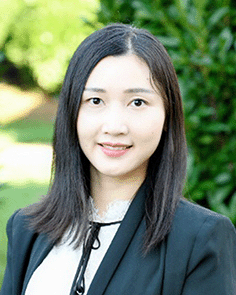Nanoscale Horizons Emerging Investigator Series: Dr Huiyuan Zhu, Virginia Tech, USA
Abstract
Our Emerging Investigator Series highlights exceptional work by early-career nanoscience and nanotechnology researchers. Read Huiyuan Zhu's Emerging Investigator Series article ‘Heterostructured Bi–Cu2S nanocrystals for efficient CO2 electroreduction to formate’ (https://doi.org/10.1039/D1NH00661D) and read more about her in the interview below.
Dr Huiyuan Zhu received her BS degree in chemistry from the University of Science and Technology in China (2009), and her PhD from Brown University (2014). From 2014 to 2018, she was one of the inaugural Liane B. Russell Fellows and then a staff scientist in the Nanomaterials Chemistry Group, Chemical Sciences Division at the Oak Ridge National Laboratory. She has been an assistant professor of Chemical Engineering at Virginia Polytechnic Institute and State University since 2018. In August 2022, she moved to the University of Virginia as an assistant professor of Chemistry. Her research interests focus on tailoring multifunctional nanostructures for catalysis, energy conversion, and chemical transformation. She has received the 2022 NSF CAREER award. She is also a recipient of the 2020 Jeffress Trust award, the 2020 Ralph E Powe Junior Faculty Enhancement Award, the 2020 Doctoral New Investigator Award of the ACS Petroleum Research Foundation, and recognized as the 2020 Journal of Materials Chemistry A Emerging Investigator and in the 2021 Class of Influential Researchers from Industrial and Engineering Chemistry Research.
Read Huiyuan Zhu's Emerging Investigator Series article ‘Heterostructured Bi–Cu 2 S nanocrystals for efficient CO 2 electroreduction to formate’ ( https://doi.org/10.1039/D1NH00661D ) and read more about her in the interview below:
NH: Your recent Nanoscale Horizons Communication describes the synthesis of heterostructured Bi–Cu 2 S nanocrystals, via a one-pot solution-phase method, as highly efficient catalysts for the electrochemical reduction of CO 2 to formate. How has your research evolved from your first article to this most recent article and where do you see your research going in future?
HZ: My first publication dates back to 2013 when I was a third-year PhD student, focusing on electrocatalytic oxygen reduction for proton exchange membrane fuel cells. Ever since my PhD studies, I have been fascinated by electrocatalysis and interfacial phenomena at solid–electrolyte interfaces. Over the years, my research has evolved from oxygen reduction and fuel oxidation reactions to electrocatalytic pathways for the sustainable conversion of abundant carbon and nitrogen sources into value-added chemicals.
The future of my research will still be focusing on leveraging atomic-level precise control of catalysts to delineate unambiguously the atomistic mechanisms, uncover the active centers, and establish structure–activity relationships of electrocatalysis. The fundamental knowledge gained here broadly impacts the understanding of design rules of efficient catalysts to meet the worldwide clean, efficient, and sustainable energy demand.
NH: What aspect of your work are you most excited about at the moment?
HZ: Sustainable nitrogen cycling, especially converting nitrate pollutants into ammonia (for ammonia production) or nitrogen (for wastewater treatment), excites me the most at the moment because finding new and sustainable ways for managing the nitrogen cycle is critical to environmental and energy sustainability.
NH: In your opinion, what are the most important questions to be asked/answered in this field of research?
HZ: First, what are the design rules for efficient, durable, and low-cost catalysts for this process? Second, how to incorporate the electrocatalytic reactors into existing water treatment infrastructure for future deployment. Finally, technoeconomically, how to optimize the integration of renewable energy, electrocatalytic reactors, water treatment plants, as well as the distribution of produced ammonia.
NH: What do you find most challenging about your research?
HZ: My research sits at the junction of chemistry, chemical engineering, material sciences, and environmental science. Finding the best graduate students equipped with all the necessary training is not easy.
NH: In which upcoming conferences or events may our readers meet you?
HZ: I typically go to AIChE annual meetings, and ACS and MRS meetings.
NH: How do you spend your spare time?
HZ: I love travel, painting, or just spending time with my family and friends in my spare time.
NH: Can you share one piece of career-related advice or wisdom with other early career scientists?
HZ: Never be afraid of failure because it could be immobilizing and stop you from the beginning. Plus, it will waste tons of time. Be courageous and adventurous in your career or research as that's just the way life is supposed to be.
| This journal is © The Royal Society of Chemistry 2022 |

